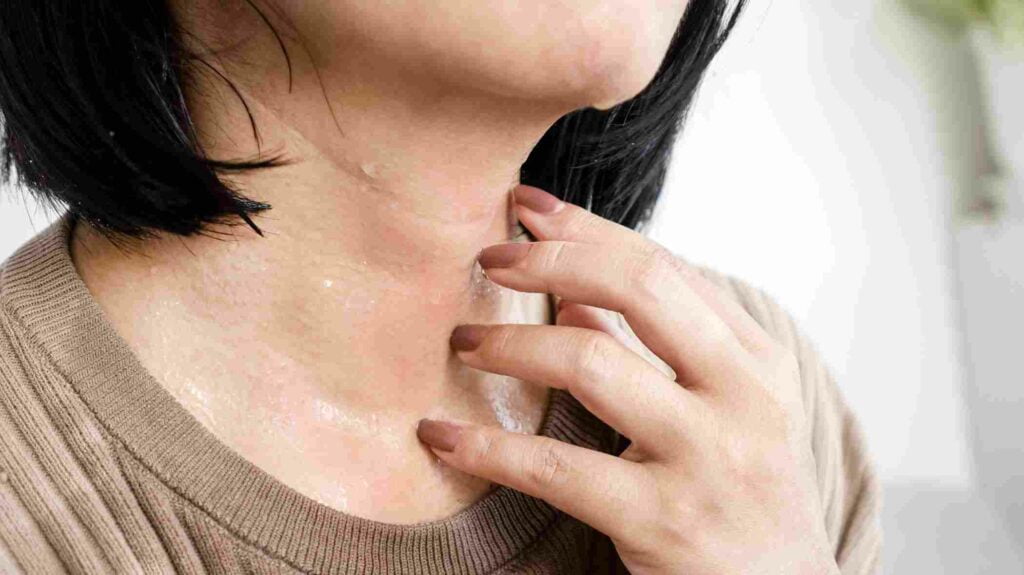Experiencing hot flashes can be a challenging and often uncomfortable part of life, especially for women undergoing menopause or certain medical treatments. These sudden waves of heat, which can be accompanied by sweating and a rapid heartbeat, are not just physical discomfort; they can also impact daily life and well-being. Fortunately, there are various over-the-counter (OTC) remedies available that can help manage and alleviate these symptoms. In this blog, we’ll explore a variety of accessible and effective over-the-counter medications for hot flashes, providing you with the knowledge and options to help you cool down and regain your comfort.
Contents
What Are The Best Over-the-counter Medications For Hot Flashes?
 The “best” over-the-counter medication for hot flashes can vary from person to person as it largely depends on individual health, the severity of symptoms, and personal preferences. However, we can provide you with information on some commonly used OTC options:
The “best” over-the-counter medication for hot flashes can vary from person to person as it largely depends on individual health, the severity of symptoms, and personal preferences. However, we can provide you with information on some commonly used OTC options:
Black Cohosh
Black Cohosh has become a popular herbal remedy for women undergoing menopausal symptoms, particularly hot flashes. This herb, which is native to North America, is often seen as a natural alternative to hormone replacement therapy. It is believed to work by having estrogen-like effects on the body, although its exact mechanism of action remains a subject of research. While some studies have shown promising results, it’s important to use it with caution.
Soy Isoflavones
Soy Isoflavones are compounds found in soy products that have been found to have estrogenic properties. They are considered phytoestrogens, plant-derived compounds that mimic some of the effects of estrogen in the body. For women experiencing menopausal symptoms like hot flashes, incorporating soy isoflavones through diet or supplements can potentially offer relief. Studies have shown varied results. However, there is evidence suggesting that they may help reduce the frequency and severity of hot flashes.
Evening Primrose Oil
Evening Primrose Oil is another supplement frequently used for a variety of women’s health issues, including hot flashes. It’s derived from the seeds of the evening primrose plant and contains gamma-linolenic acid, a type of fatty acid. While some people report relief from menopausal symptoms with its use, scientific evidence backing its effectiveness is not robust. The research on evening primrose oil has produced mixed results, and it’s generally considered less effective compared to other herbal remedies like black cohosh or soy isoflavones. Nonetheless, it remains a popular choice, often valued for its minimal side effects.
Vitamin E
 Vitamin E is a fat-soluble vitamin known for its antioxidant properties, and it has been studied for its potential in alleviating hot flashes. Some research indicates that vitamin E can provide mild relief from hot flashes. This relief is thought to be due to Vitamin E’s role in modulating hormone production and its antioxidant effects, which might help regulate body temperature. However, the evidence is not conclusive, and vitamin E supplements should be taken with caution, especially at higher doses. Excessive vitamin E intake can pose health risks, especially in individuals taking blood thinners or with vitamin K deficiency.
Vitamin E is a fat-soluble vitamin known for its antioxidant properties, and it has been studied for its potential in alleviating hot flashes. Some research indicates that vitamin E can provide mild relief from hot flashes. This relief is thought to be due to Vitamin E’s role in modulating hormone production and its antioxidant effects, which might help regulate body temperature. However, the evidence is not conclusive, and vitamin E supplements should be taken with caution, especially at higher doses. Excessive vitamin E intake can pose health risks, especially in individuals taking blood thinners or with vitamin K deficiency.
Progesterone Creams
Over-the-counter progesterone creams are available in some countries and are often marketed for menopausal symptoms like hot flashes. These creams contain a synthetic form of progesterone and are applied topically. The idea is that supplementing progesterone might help balance hormones and alleviate symptoms. There’s also a lack of standardization in terms of dosage and formulation in these products, which can lead to inconsistent results. Women considering this option should discuss it with their healthcare provider, particularly if they have a history of hormone-sensitive conditions.
Magnesium
Magnesium is a mineral involved in numerous body processes, including muscle and nerve function, blood glucose control, and blood pressure regulation. It’s thought that magnesium might help with hot flashes due to its calming effect on the body’s nervous system and its role in temperature regulation. Some women find that magnesium supplements can provide some degree of relief from hot flashes, although scientific evidence in this area is still emerging. Consulting with a healthcare provider before starting magnesium supplements is always a prudent step.
It’s important to note that some supplements can interact with other medications and have side effects. Therefore, it’s crucial to consult with a healthcare provider before starting any new treatment for hot flashes. Especially if you have underlying health conditions or are taking other medications.
Lifestyle Tips For Reducing Hot Flashes
 Managing hot flashes often requires a multi-faceted approach, combining over-the-counter medications for hot flashes with lifestyle adjustments. Here are some effective lifestyle tips that can help reduce:
Managing hot flashes often requires a multi-faceted approach, combining over-the-counter medications for hot flashes with lifestyle adjustments. Here are some effective lifestyle tips that can help reduce:
Dress in Layers
Wearing layers of clothing makes it easier to adjust to changing body temperatures. Opt for clothes made from natural fibers like cotton. This allows the skin to breathe and absorb sweat more effectively.
Maintain a Cool Environment
Keep your living and workspace cool. Use fans or air conditioning to regulate the temperature. At night, consider using breathable, moisture-wicking bed linens and sleepwear.
Mind Your Diet
Certain foods and drinks can trigger hot flashes. Spicy foods, caffeine, alcohol, and hot beverages are known culprits. Pay attention to your body’s reactions to different foods and try to identify and avoid your triggers.
Stay Hydrated
Drink plenty of water throughout the day. Staying hydrated helps regulate body temperature and can reduce the severity of hot flashes.
Practice Stress-Reduction Techniques
Stress can exacerbate hot flashes. Techniques such as yoga, meditation, deep breathing exercises, or mindfulness can help manage stress levels. Regular practice of these techniques can have a calming effect and may reduce the frequency of hot flashes.
Regular Exercise
Physical activity can help balance hormones and improve mood, which might help reduce hot flashes. Activities like walking, swimming, cycling, or yoga can be particularly beneficial. Aim for at least 30 minutes of moderate exercise most days of the week.
Avoid Smoking
Smoking is linked to an increase in hot flashes. Quitting smoking can improve overall health and may help reduce hot flashes.
Watch Your Weight
Being overweight can increase the frequency and severity of hot flashes. Maintaining a healthy weight through diet and exercise can help reduce these symptoms.
Cooling Products
Consider using products designed to cool the body, such as cooling gels, sprays, or wearable items like cooling scarves or vests.
Consider Alternative Therapies
Some women find relief through alternative therapies like acupuncture or reflexology. While scientific evidence supporting these methods is varied, they may be worth trying, especially if traditional methods haven’t been effective.
Remember, the effectiveness of these tips can vary from person to person. It might take some experimentation to find out what works best for you. Additionally, it’s always a good idea to consult with a healthcare provider before making significant changes to your lifestyle, especially if you have underlying health conditions.
Conclusion
In conclusion, managing hot flashes can be a challenging but manageable part of life. By exploring a variety of over-the-counter medications for hot flashes, such as herbal supplements, vitamins, and non-prescription hormonal preparations, along with making smart lifestyle changes, you can find relief and comfort. Remember, every individual’s experience with hot flashes is unique, and what works for one person may not work for another. Therefore, it’s important to be patient and open-minded as you try different methods to find what best suits your needs.
Ultimately, remember that with the right approach, you can effectively manage and reduce the impact of hot flashes on your daily life. If you are facing menopause-related issues, menopause treatment at HerMantra can help. Book your free trial online menopause treatment session now.


